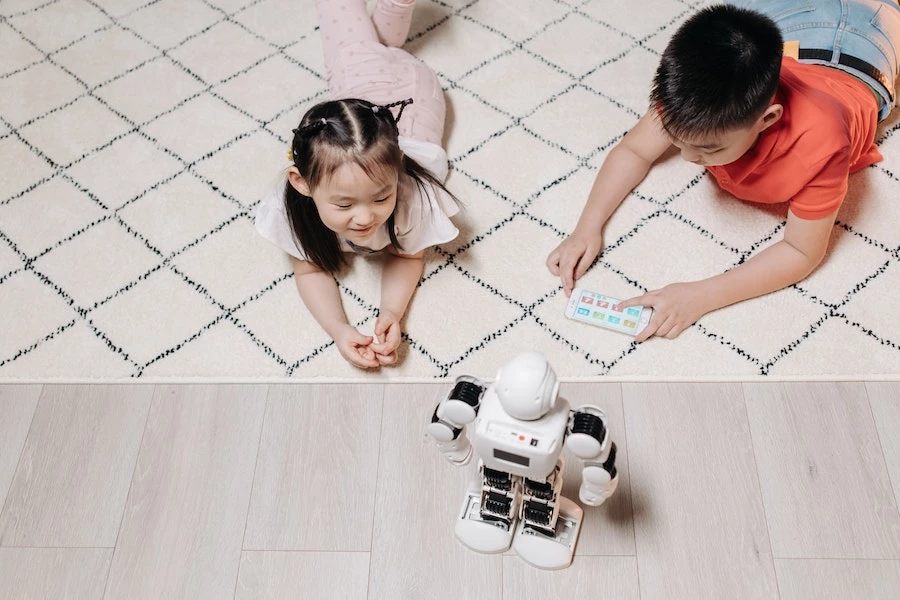Since the rise of technology, we have been witnessing a rapid expansion of robots entering our households. Not only can robots save us time with household chores such as vacuuming, mopping, and dishwashing, but they can also offer educational opportunities or entertainment for family members. Today, we will explore how robotics may change household chores forever and what this means for education, leisure pursuits, and our social & economic systems.
The End Of Household Chores
Robots can do tasks that humans cannot or would rather not do, making them an invaluable source to ease those tedious domestic jobs around the house. Having robotic helpers could take away most, if not all, tedious chores from households, giving people more free time to pursue whatever activity they like. Thus, taking their mind off mundane everyday activities like cleaning dishes or tidying up every evening after work shifts are done for the day.
Robotic vacuum cleaners have advanced tremendously since their invention back in 2005, and today’s Roombas will even sweep pet hair too! Other functional appliances include automatic floor scrubbers that leave your floors polished without putting any effort into your behalf. Others, like dryers, utilize hot steam to maximize cleanliness while leaving no streaks behind or wasting electricity by needlessly running cycles overnight.
Likewise, intelligent ovens already exist that allow you to bake ingredients simultaneously at different temperatures or switch cooking programs remotely via your mobile phone – right at home – so you can start boiling water before ever arriving there!
That said, we should familiarize ourselves with robots privacy risks covered in the ExpressVPN article before using home robots.
The Future Of Education And Entertainment
Robotics has moved into new realms with entertainment, such as companion bots who keep children company when parents go out of town on business trips – raising their happiness levels both physically & emotionally (providing much-needed affection).
Such examples highlight the potential use cases robotics has beyond general housekeeping duties, demonstrating it is something we should also factor in when talking about education in terms of telepresence robots where class teachings occur remotely with students able to join classes virtually.
An example here is tablet computers being available so lessons can become interactive, something that allows friends far away to meet up easily through video messages. Undoubtedly, these are revolutionizing future teaching methods, enabling children to learn world languages faster than ever.
Again, providing classroom robot facilitators increases average student participation (ensuring shy people get the chance to express themselves), while active learning offers unique physical elements.
The last point enhances academic performance examination results, meaning universities can now analyze and prepare reports on teachers’ grade exam answers correctly as well as evaluate that all information is transmitted accurately. No longer are robots just dumb machines that perform the task instructed. Many now understand tone, recognize objects nearby, and are equipped with cameras and microphones to interact reactively.
Finally, we discuss the potential macroeconomic implications of robotics uptake. Its abilities extend much farther than fields like agriculture, construction, manufacturing, ship-building, predictive analytics, medical services, ethics, and computer vision. Allowing retailers to better anticipate consumer needs prior to sale, averting losses as demand products thanks to artificial intelligence “learning” technologies!
Social And Economic Implications
Integrating robotic tools within daily life alters established behavioral patterns, economically speaking. In other words, society begins to structure itself differently, incentivizing the market to revive and requiring new regulatory legislation to be enacted to protect vulnerable groups affected.
Solutions for established businesses need to re-engineer operations and map digital transformation to open doors to capital investment, stimulating job growth in ways impossible to say. However, labor decline concerns surround the community, given the competition from machines and wealth accumulated by owners.
The world starts to fear that robot executives will one day replace human CEOs, and employment is not secure. AI trends turn things upside down and are sometimes found disruptive. Implementation changes must observe directed or even involuntary behavioral adjustments and automation shifts. Despite the gloom effects, we must address the sense of threat and accurately understand the outcomes.
Consequently, attention and focus should be on proactive preparation frameworks to ensure the nations behave responsibly, bringing fruitful success and changing the global landscape!
